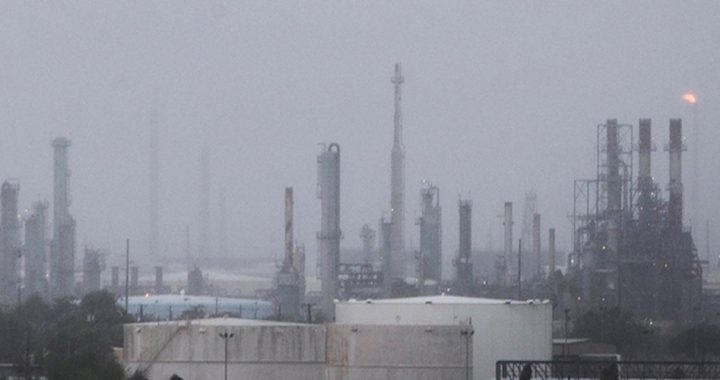
On Friday President Donald Trump once again ramped up sanctions against Venezuela’s Marxist dictator, shutting off his ability to sell new debt or equity in the U.S. financial markets. On Saturday, Hurricane Harvey, the worst hurricane to hit the Gulf Coast in 50 years, has all but sealed Maduro’s fate.
Following Maduro’s installation of his illegal “constituent assembly” in July, President Trump placed sanctions on Maduro himself, freezing any and all of his assets lying within American jurisdiction. A week later Trump added a few of Maduro’s cronies to that list, and on August 9 he added a few more. At the time The New American expressed skepticism that they would have any effect on Maduro’s obstinacy and determination to continue policies that have caused Venezuela’s economy to shrink by 35 percent just since 2014.
On Friday the Trump administration broadened those sanctions to include anyone buying or selling Venezuela financial instruments — debt or equity — including those being offered by the country’s oil company, PdVSA. The sanctions were placed not only on Wall Street but also on any U.S. banks considering making new loans to Maduro. This would prevent future transactions like those engaged in by Goldman Sachs when it bought some $2.8 billion of Venezuelan bonds, giving Maduro much needed financial resuscitation.
The Treasury Department explained why it was issuing the new sanctions under President Trump’s executive order:
The Maduro dictatorship continues to deprive the Venezuelan people of food and medicine, imprison the democratically-elected opposition, and violently suppress freedom of speech. The regime’s decision to create an illegitimate Constituent Assembly — and most recently to have that body usurp the powers of the democratically-elected National Assembly — represents a fundamental break in Venezuela’s legitimate constitutional order.
In an effort to preserve itself, the Madura dictatorship rewards and enriches corrupt officials in the government’s security apparatus by burdening future generations of Venezuelans with massively expensive debts. Maduro’s economic mismanagement and rampant plundering of his nation’s assets have taken Venezuela ever closer to default. His officials are now resorting to opaque financing schemes and liquidating the country’s assets at fire sale prices.
These new sanctions were designed carefully to ramp up pressure on Maduro and his communist/Marxist regime:
These measures are carefully calibrated to deny the Maduro dictatorship a critical source of financing to maintain its illegitimate rule [and] protect the United States financial system from complicity in Venezuela’s corruption.
For the Trump administration the math is simple, and almost inevitable. Maduro has incurred more than $150 billion in debt from lenders around the world, including Russia, China, and Cuba. His regime is scheduled to make $5 billion in principal and interest payments before the end of the year, but he doesn’t have the funds. Best estimates are that he has about $7 billion in gold and just $3 billion in foreign currency reserves. If he defaults, then his oil company’s assets could be seized, stopping his cash flow and ending his regime. As the writer at ZeroHedge explained:
The decision to block trading of Venezuela bonds could well be the tipping point that forces creditors to finally give up on the Caracas regime, leading to a prompt default and the fall of Maduro.
What could keep Maduro’s dictatorship alive is the $1 billion flowing into his oil company every month from American refineries located along the Gulf Coast. Many of those refineries belong to Big Oil — i.e., Chevron, Valero, Citgo (which is owned by PdVSA), and Phillips 66 — which has persuaded Trump that shutting down their ability to purchase Venezuelan heavy crude (for which their refineries are specifically designed) would hurt Americans. In addition to exporting its heavy crude to these refineries, Venezuela imports American light sweet crude oil to be refined at PdVSA and then sold abroad, generating still additional revenues for Maduro.
Enter Mother Nature — or an act of God, if you prefer. What Trump is unwilling to do is being accomplished by Hurricane Harvey. Nearly one-third of U.S. refining capacity lies directly in Harvey’s path, from Corpus Christi, Texas, to Lake Charles, Louisiana. As of Saturday, long before the full impact of the storm had been felt, more than one quarter of that oil refining capacity had been shut down and workers sent home. Jenna Delaney, an oil analyst with PIRA Energy, said on Saturday that “we could see more production be taken offline in the Gulf of Mexico,” after having noted that Exxon Mobil had already closed two of its platforms and was evacuating its workers. Likewise Shell and Anadarko had shut down five platforms before Harvey hit. And ConocoPhillips stopped all drilling and exploration efforts in the Eagle Ford shale formation, which lies beneath Harvey’s path.
Depending on the severity of Harvey, it could be weeks or even months before those refineries are back online.
Between Trump and Mother Nature the math becomes even more persuasive — Maduro’s inability to sell new debt in U.S. financial markets, and his oil company’s inability to sell its oil to American refineries, is making his end imminent. And some analysts are suggesting that Cuba, Russia, China, which have collectively (no pun intended) loaned Maduro billions they will never see, are unlikely to continue throwing good money after bad.
In other words, the floods in Texas — along with some help from Trump — are sinking Maduro.
Photo shows oil refinery in Corpus Christi, Texas, as Hurricane Harvey moves in: AP Images
An Ivy League graduate and former investment advisor, Bob is a regular contributor to The New American magazine and blogs frequently at LightFromTheRight.com, primarily on economics and politics. He can be reached at [email protected].
Related articles:
Additional Sanctions by United States Proving of Little Value in Venezuela
U.S.-imposed Sanctions to Squeeze Venezuela’s Marxist Dictator



